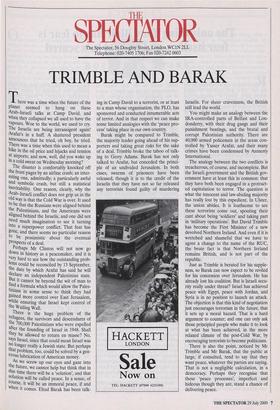SPECTAT T HE O R The Spectator, 56 Doughty Street, London WC1N 2LL
Telephone: 020-7405 1706; Fax 020-7242 0603
TRIMBLE AND BARAK
There was a time when the future of the planet seemed to hang on these Arab—Israeli talks at Camp David, and when they collapsed we all used to have the vapours. Woe to the world, we used to cry. The Israelis are being intransigent again! Arafat's in a huff. A shattered president announces that he tried, oh boy, he tried. There was a time when this used to mean a hike in the oil price and hijacks and tension at airports; and now, well, did you wake up in a cold sweat on Wednesday morning? The disaster is comfortably knocked off the front pages by an airline crash; an inter- esting one, admittedly; a particularly awful and symbolic crash, but still a statistical inevitability. One reason, clearly, why the Arab—Israeli conflict does not grip us in the old way is that the Cold War is over. It used to be that the Russians were aligned behind the Palestinians, and the Americans were aligned behind the Israelis, and one did not need much imagination to see it turning into a superpower conflict. That fear has gone, and there seems no particular reason to be pessimistic about the eventual prospects of a deal.
Perhaps Mr Clinton will not now go down in history as a peacemaker, and it is very hard to see how the outstanding prob- lems could be reconciled by 13 September, the date by which Arafat has said he will declare an independent Palestinian state. But it cannot be beyond the wit of man to find a formula which would allow the Pales- tinians in some sense to think they had gained more control over East Jerusalem, while ensuring that Israel kept control of the Wailing Wall. There is the huge problem of the refugees, the survivors and descendants of the 700,000 Palestinians who were expelled after the founding of Israel in 1948. Shall they be allowed to return en masse? No, says Israel, since that could mean Israel was no longer really a Jewish state. But perhaps that problem, too, could be solved by a gen- erous lubrication of American money. As we screw up our eyes and gaze into the future, we cannot help but think that in due time there will be a 'solution', and that solution will be called peace. In a sense, of course, it will be an immoral peace, if and when it comes. Ehud Barak has been talk- ing in Camp David to a terrorist, or at least to a man whose organisation, the PLO, has sponsored and conducted innumerable acts of terror. And in that respect we can make some limited analogies with the 'peace pro- cess' taking place in our own country.
Barak might be compared to Trimble, the majority leader going ahead of his sup- porters and taking great risks for the sake of a deal, Trimble broke the taboo of talk- ing to Gerry Adams. Barak has not only talked to Arafat, but conceded the princi- ple of an undivided Jerusalem. In both cases, swarms of prisoners have been released, though it is to the credit of the Israelis that they have not so far released any terrorists found guilty of murdering Israelis. For sheer cravenness, the British still lead the world.
You might make an analogy between the IRA-controlled parts of Belfast and Lon- donderry, with their drug gangs and their punishment beatings, and the brutal and corrupt Palestinian authority. There are 40,000 armed policemen in the areas con- trolled by Yasser Arafat, and their many crimes have been condemned by Amnesty International.
The analogy between the two conflicts is treacherous, of course, and incomplete. But the Israeli government and the British gov- ernment have at least this in common: that they have both been engaged in a protract- ed capitulation to terror. The question is what the innocent and law-abiding majority has really lost by this expedient. In Ulster, the union abides. It is loathsome to see these terrorists come out, spouting their cant about being 'soldiers' and taking part in 'military operations'. But David Trimble has become the First Minister of a new devolved Northern Ireland. And even if it is wretched and shameful that we have to agree a change to the name of the RUC, the brute fact is that Northern Ireland remains British, and is not part of the republic.
Just as Trimble is berated for his supple- ness, so Barak can now expect to be reviled for his concession over Jerusalem. He has already lost his coalition. But is Israeli secu- rity really under threat? Israel has achieved peace with Egypt, peace with Jordan, and Syria is in no position to launch an attack. The objection is that this kind of negotiation just encourages terrorism in the future, that it sets up a moral hazard. That is a hard argument to counter; and one can only ask those principled people who make it to look at what has been achieved, in the more relaxed climate of the post-Cold War, by encouraging terrorists to become politicians.
There is also the point, noticed by Mr Trimble and Mr Barak, that the public at large, if consulted, tend to say that they want peace, whatever the parties are saying. That is not a negligible calculation, in a democracy. Perhaps they recognise that these 'peace processes', imperfect and hideous though they are, stand a chance of delivering peace.


























































 Previous page
Previous page